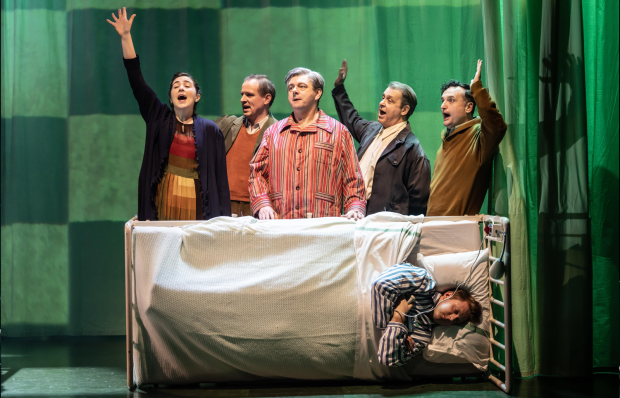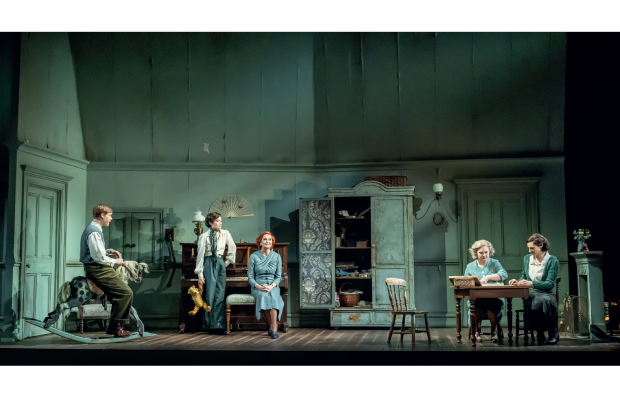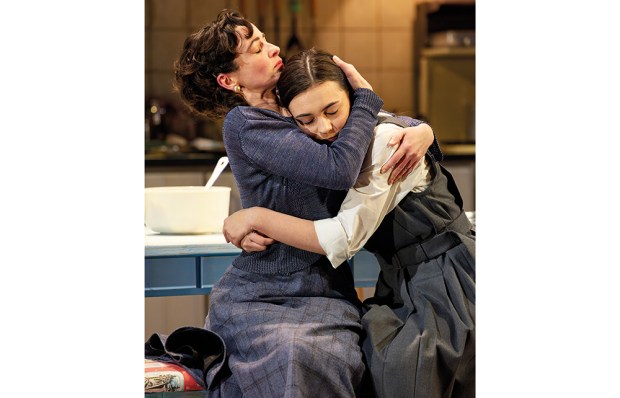The Prince of Egypt is a musical adapted from a 1998 Dreamworks cartoon based on the Book of Exodus. So the original writer is God. The show opens with a troupe of fit young athletes working on Pharaoh’s latest tomb. And they look like the best-fed slaves in history. A meat-rich diet and round-the-clock access to a gym and a sauna must have been written into their contracts. The tanned abs of the male slaves ripple and gleam. The lithe females are bendier than hosepipes. Presumably these cartwheeling ballerinas are able to limber up in an air-conditioned dance studio before each shift. The only drawback is lugging blocks of stone up and down half-finished pyramids but these exertions barely interrupt their main task: singing and dancing about their pitiful lot.
A newborn member of their tribe, Moses (meaning ‘Deliverance’), is discovered floating downstream in a picnic hamper. Pharaoh’s wife adopts the lucky foundling and raises him alongside her son Ramses. The script, which Philip LaZebnik has adapted from God’s first draft, doesn’t speculate on Moses’s peculiar upbringing. Freud thought the story hinted at an adulterous pregnancy.
Ramses and Moses grow up in a palace whose stylings honour the glories of the 1970s. Male courtiers wear cricketing whites and hip-length judo tunics. Pharaoh’s kingly rank is indicated by a pair of chunky epaulettes whose gold tassels are longer than the ears of an Afghan hound. The in-house baddie, Hotep, sports a billowing kaftan that might have sheathed the amplitude of Demis Roussos.
The plot moves with predictable stateliness. Pharaoh dies, Ramses inherits, war breaks out, Moses is exiled. In the desert he’s welcomed by the nomadic Midianites. These hospitable, music-loving people, led by a bearded sage named Jethro, have characteristics that we would call Jewish but the script avoids such terms. ‘Hebrew’ is the preferred label. And the land of Israel to which Moses leads them is called ‘our little kingdom by the sea’. That sounds like a timeshare on Lundy Island. Why is the show so keen to pretend that the roots of the Jewish faith have nothing to do with modern-day Jews?
When the clunky dialogue ceases, the visuals are good. The burning bush is done with a dozen artistes squirming and writhing in a fast-motion yoga display illuminated by Trump-coloured spotlights. At the climax, the Red Sea separates into two vast wintry cliffs of seething water. The Hebrews slip through, like commuters squeezing aboard a departing Tube, while the stranded Egyptians are swept away as the seas roll back. Poor old Hotep is sucked down a black hole, kaftan and all. This large-scale spectacle is done with a pleasing hint of self-mockery. But the sheer size of the Dominion is a disadvantage. It’s hard for an audience to engage with moments of intimacy, warmth or lightness in an arena that is so large it could be outdoors. Imagine a Wembley crowd watching a man on the centre spot juggling matchboxes.
Ramses and Moses (Liam Tamne and Luke Brady) play their roles as bickering buddies whose cub fights and verbal joshing don’t suit the operatic heights to which the show aspires. They seem like a pair of dudes running a laptop repair shop in Ealing. Andrew Pearce has great presence as the leering villainous Hotep. He deserves better parts. Debbie Kurup (Queen Tuya) is highly watchable, and Tanisha Spring (Nefertari) gives convincing displays of jealousy, anger and lustfulness which are not in the script. She just suggests them physically. A lot of cash has been pumped into this epic. I’d be surprised if there was any change from five million. Sadly, I wasn’t greatly impressed and though I chuckled occasionally I wasn’t moved in the slightest. Ditto my son, aged 13. As we departed through the soaring lobby, he said: ‘Do you think theatre will ever die out?’
Women Beware Women is a seldom-revived melodrama by Thomas Middleton. The plot involves rape and murder among the Italian nobility and needs to be studied in advance. Amy Hodge has laid on a feminist production with a stern programme note about fighting the patriarchy. Yet she casts females in key male roles. The most loathsome character, the Ward, is a rich spoilt brat who represents over-privileged cockiness at its worst. But he’s played by Helen Cripps. Thus, at a stroke, Middleton’s attempt to examine toxic masculinity is destroyed. Elsewhere the casting is bound to confuse anyone who doesn’t hold a degree in Jacobean literature. Tara Fitzgerald, who is white, plays the sister of Daon Broni, who is black, and it’s just about possible, with constant internal reminders, to remain aware of their close kinship. It’s much harder to twig that Gloria Onitiri (Guardiano), who is also black, represents a middle-aged white male whose nephew is the Ward.
Intelligibility should never be sacrificed to ideology. The result is an insult to the audience.
Got something to add? Join the discussion and comment below.
Get 10 issues for just $10
Subscribe to The Spectator Australia today for the next 10 magazine issues, plus full online access, for just $10.
You might disagree with half of it, but you’ll enjoy reading all of it. Try your first month for free, then just $2 a week for the remainder of your first year.













Comments
Don't miss out
Join the conversation with other Spectator Australia readers. Subscribe to leave a comment.
SUBSCRIBEAlready a subscriber? Log in